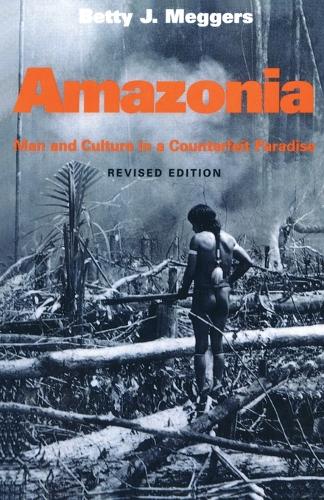
Amazonia: Man and Culture in a Counterfeit Paradise, Revised Edition
(Paperback, Revised edition)
Publishing Details
Amazonia: Man and Culture in a Counterfeit Paradise, Revised Edition
By (Author) Betty J. Meggers
Smithsonian Books
Smithsonian Institution Scholarly Press
17th July 1996
Revised edition
United States
Classifications
General
Non Fiction
Social impact of environmental issues
Applied ecology
981.1
Physical Properties
Paperback
214
Width 138mm, Height 210mm, Spine 12mm
281g
Description
When first published in 1971, Amazonia was a pioneering contribution to the emerging field of cultural ecology. Betty Meggers argued that the Amazon's luxurious vegetation concealed significant limitations for human exploitation, placing a ceiling on pre-Columbian population density and social complexity. This controversial view has implications for academic anthropology and also relates to the modern development of Amazonia, including attempts to introduce sustainable methods of intensive exploitation. Amazonia in this revised new edition includes recent biological and climatic data. Ethnographic and archaeological evidence reemphasize the complexity of the ecosystem and broaden our understanding of past and present sophisticated adaptations among indigenous groups.
Reviews
Amazonia provides the most comprehensive anthropological discussion so far of the Amazon basin as a human habitat... This book specifies variables influencing cultural adaptation in the Amazon basin and presents a set of general principles constituting a theory of cultural evolution. In two descriptive sections of the book, Meggers analyzes the selective pressures in two distinct geographical zones: the terra firme or unflooded land, and the varzea or periodic floodplain. -- Ellen B. Bass Science Meggers has marshalled an impressive argument on the ecological imperatives of a truly unique Amazonia... We are given a well-written and quite thorough description of the physical features of the two zones and a series of ethnographic vignettes to illustrate the action of cultural adaptation. Man An excellent, concise statement of the facts of the ecology of humid tropical lowlands, systematic descriptions of a number of widely spread Amazonian cultures, and a skillful integration of these two bodies of knowledge. The result is a demonstration that cultures are as surely subject to and molded by natural selection and environmental characteristics as are species of plants and animals... Amazonia will inevitably be a basic text for the field of tropical ecology. -- F. R. Fosberg Ecology
Author Bio
Betty J. Meggers is a research anthropologist at the National Museum of Natural History, Smithsonian Instituion, and an honorary fellow of the Association for Tropical Biology.
